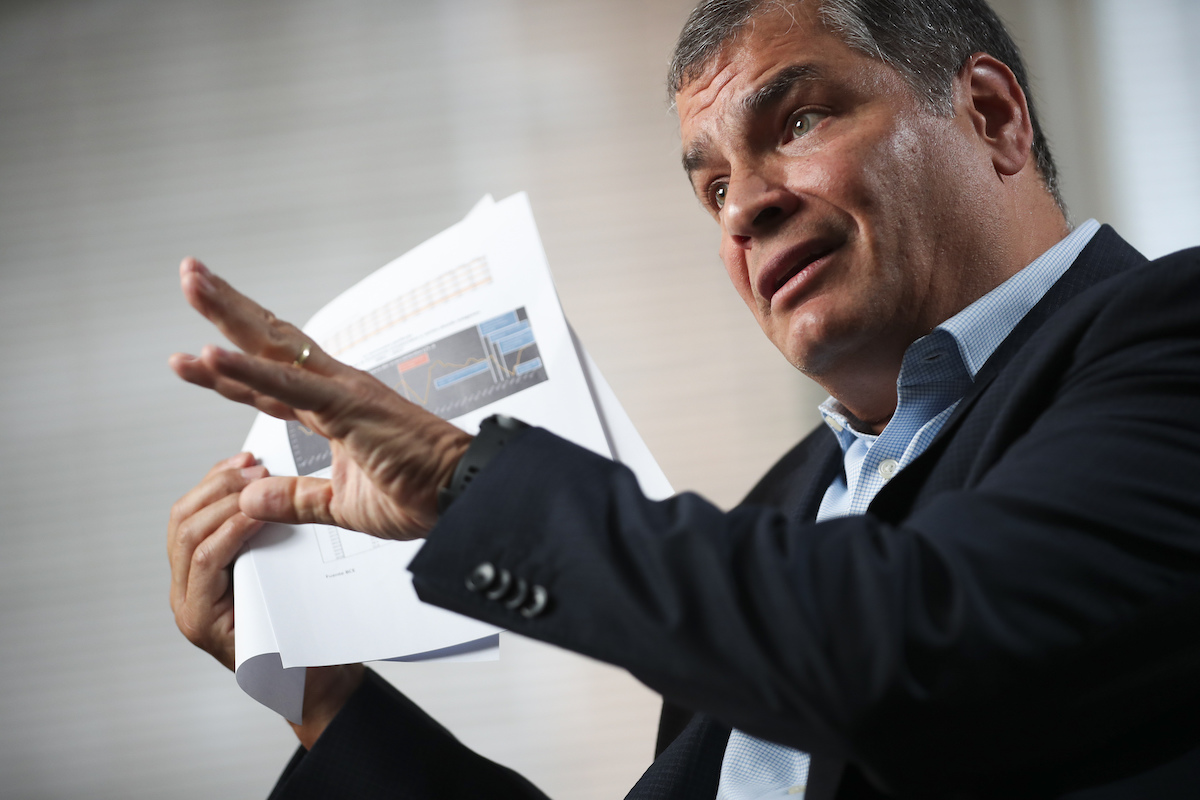

In this October 10, 2019 file photo, Ecuador’s former President Rafael Correa gives an interview in Brussels, Belgium. (AP Photo/Francisco Seco, File)
By GONZALO SOLANO and CHRISTINE ARMARIO, Associated Press
QUITO, Ecuador (AP) — Prosecutors opened what some are calling Ecuador’s trial of a century Monday against former President Rafael Correa and 20 other high-ranking politicians and business leaders accused of operating a multimillion-dollar bribery scheme.
If convicted, the man who ruled Ecuador for a decade could be barred from running for office again, ending one of the nation’s most enduring and polemic political legacies.
“His presence carries a lot of weight in Ecuadorean politics,” said Simón Pachano, a professor at the Latin American Faculty of Social Sciences university. “Whatever happens will have a lot of repercussions in the country.”
The 56-year-old former president is accused of overseeing a plot in which foreign and local businesses made cash payments to his PAIS Alliance political party in exchange for lucrative public works contracts. The payments were allegedly made between 2012 to 2016, years that overlap with Correa’s time in the presidency. He disputes the allegations, which he likens to a political witch hunt.
“This is LAWFARE,” Correa wrote recently on Twitter. “Objective: To stop us from participating in the next elections.”
Correa led the country until 2017, a period of economic stability and growth driven by an oil boom and loans from China that allowed him to expand social program, build roads, schools and other projects that transformed Ecuador. But he governed with an iron fist – silencing or punishing critics in the press, opposition and judiciary – and his legacy has grown increasingly tarnished in recent years.
He has publicly feuded with his hand-picked successor, Lenín Moreno, who he accuses betraying his “Citizens’ Revolution,” and came under investigation for the botched 2012 kidnapping of an opposition lawmaker. Still, Correa is believed to still have the support of about a quarter of the population. Though he cannot run for president again because of term limits, he could seek a seat in Congress.
“He’s not politically dead yet,” said Carlos de la Torre, director of the Center for Latin American Studies at the University of Florida.
Chief Prosecutor Diana Salazar opened the proceeding at the National Court of Justice describing a “criminal structure” within the PAIS Alliance party. Operating with code names, 11 officials collectively took in about $7.7 million from 10 representatives of various companies, she said. The funds allegedly were used for political activities like publicity, parties, campaigns and private security.
“They betrayed the confidence placed in them by the Ecuadorean people,” Salazar said.
Those found guilty face three to five years in jail.
Correa’s lawyer, Fausto Jarrín, accused the court of acting without due process of law because the trial opened and is proceeding despite his request to have three judges removed from the case. Correa is currently in self-imposed exile in his wife’s native Belgium. It remains unclear whether he will testify, though the court is allowing several of those charged to stream in through live video.
Among the other defendants are Jorge Glas, Correa’s former vice president, who is currently serving a six-year sentence for taking bribes from Odebrecht, the Brazilian construction giant at the center of the region’s largest graft scandal. Odebrecht has admitted to paying nearly $800 million in bribes, much of it to officials in Latin America who rewarded the company with construction contracts.
The Odebrecht scandal has ended the careers of some of Latin America’s most prominent politicians and incited a regional reckoning on deeply entrenched corruption. Odebrecht is not named in the current case against Correa, though a similar pattern of politicians taking bribes in exchange for contracts is alleged.
At the trial Monday, Gabriela Moreira, a lawyer for businessman Pedro Verduga, owner of Ecuadorean construction company Equitesa, said one of Correa’s advisers, Pamela Martínez, had pressured his client into paying bribes, threatening to withdraw payments from the state on contracts they’d be given.
Separately, a former judicial secretary to Correa recently posted on Twitter documents showing payments made to Martínez.
“This is a practice that has not only been done in Ecuador, but all of Latin America,” Pachano said. “That doesn’t justify it.”
The case comes as Ecuador’s current president struggles to revive a tepid economy. Moreno remains on weak aground after nearly two weeks of violent protests last year. The demonstrations were sparked by Moreno’s abrupt decision to end fuel subsidies and were resolved by striking a deal with indigenous leaders to cancel an International Monetary Fund-backed austerity package.
Though the trial could end Correa’s political aspirations, there’s also a chance he could find a way to forge a path forward.
If the trial drags on, it could potentially overlap with the run-up to next year’s elections. If Correa were to announce he is running for legislative office, he could receive parliamentary immunity, shielding him from prosecution, analysts said.
“If he is found guilty, he will never be able to come back as a politician to Ecuador,” de la Torre said. “My feeling is that will be it for Correa.”
On the streets of Quito, some Ecuadoreans like María de Lourdes Tipán, 34, a messenger, said they had difficulty believing Correa was directly responsible for any bribery that took place during his government.
“They should punish those who robbed and not a man who did so much for the poor,” she said.
Others took a less forgiving approach.
“Correa now is synonymous with bribery,” said Juan Rodríguez, 21, a university student. “It’s terrible for the image of Ecuador to be so tarnished by a government of thieves.”
***
Christine Armario reported from Bogotá, Colombia.


